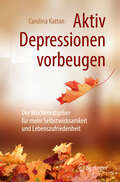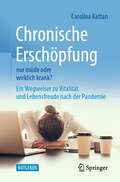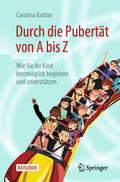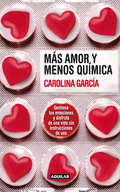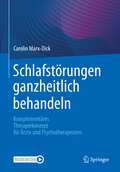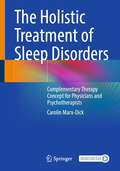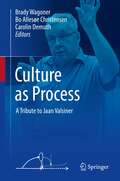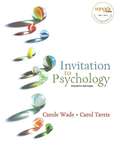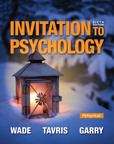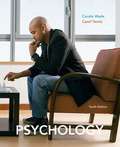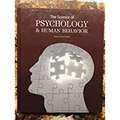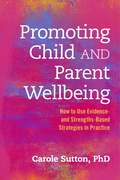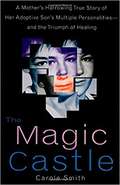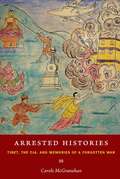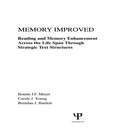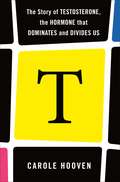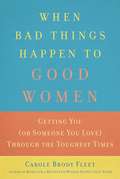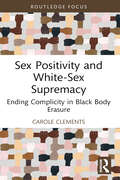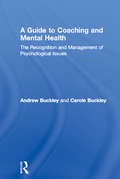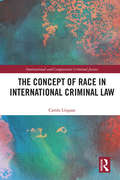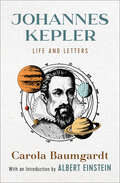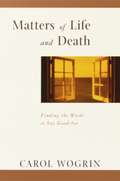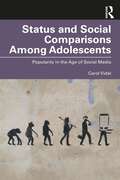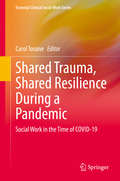- Table View
- List View
Aktiv Depressionen vorbeugen: Der Wochenratgeber für mehr Selbstwirksamkeit und Lebenszufriedenheit
by Carolina KattanManchmal drückt einfach der Schuh, aber wir wissen noch nicht genau, was wir dagegen unternehmen können. Meist schleichend kann sich aus gedrückter Stimmung und negativen Gedanken im Laufe der Zeit eine depressive Erkrankung entwickeln.Dieser Ratgeber unterstützt Sie darin, unbeschwert und zufrieden durch das Leben zu gehen: Mittels Achtsamkeit und Selbstreflexion lernen Sie Woche für Woche in zahlreichen alltagsrelevanten Übungen, Ihre Selbstwirksamkeit zu stärken, mehr Lebenszufriedenheit zu empfinden und der Entstehung von Depressionen vorzubeugen. Die 40 Übungen zu verschiedenen Lebensthemen bieten Ihnen die Möglichkeit, sich selbst besser zu verstehen, mögliche Mangelzustände zu erkennen, unter strukturierter Anleitung ungünstige Gedanken zu verändern und stärkende Ressourcen aufzubauen.Das wochenweise Vorgehen eignet sich für Menschen aller Altersklassen, die ohne große theoretische Einleitungen direkt loslegen möchten, und besonders für Menschen, die die Wartezeit auf einen Therapieplatz strukturiert und selbst aktiv gestalten wollen.
Chronische Erschöpfung - nur müde oder wirklich krank?: Ein Wegweiser zu Vitalität und Lebensfreude nach der Pandemie
by Carolina KattanStändig müde und erschöpft? Nicht erst seit dem Beginn der Corona-Pandemie klagen viele Menschen über Erschöpfungszustände oder anhaltende Müdigkeit und Abgeschlagenheit im Alltag! Dieser Ratgeber zeigt Ihnen, woran dies liegen kann und was Sie tun können. Denn die Gründe können vielfältig sein – von der ernsthaften medizinischen Ursache über falsche Verhaltens- oder Schlafgewohnheiten bis hin zu Überlastungen im Alltag. Seit der Corona-Pandemie sind viele Belastungsfaktoren hinzugekommen: Durch Kontaktbeschränkungen und Homeoffice ist die körperliche Aktivität reduziert, werden Zukunftsängste geschürt und die Stimmung negativ beeinflusst. Die Differentialdiagnose einer anhaltenden Erschöpfung durch Long-COVID gewinnt an Bedeutung. Carolina Kattan bietet einen klaren Leitfaden für eine stufenweise Abklärung medizinischer und psychologischer Faktoren. Neben Aufklärung über den Einfluss von Schlafgewohnheiten, falscher Ernährung, ungünstigen Lebensgewohnheiten, Begleiterkrankungen und Umweltfaktoren gibt die Autorin zahlreiche Tipps und Hilfsangebote. – Konnte eine körperliche Ursache ausgeschlossen werden, so helfen konkrete Übungen dabei, die Müdigkeit zu reduzieren und mit den körperlichen und psychischen Einschränkungen besser umgehen zu lernen. Das verständlich geschriebene Buch beleuchtet damit sämtliche Aspekte, die in Zusammenhang mit einem Müdigkeitssyndrom relevant sind und bietet eine konkrete Anleitung, wie Müdigkeitssymptome strukturiert beim Hausarzt abgeklärt werden können.
Durch die Pubertät von A bis Z: Wie Sie Ihr Kind bestmöglich begleiten und unterstützen
by Carolina KattanEltern wünschen sich nichts sehnlicher, als dass aus ihren Kindern einmal selbstständige, selbstbewusste, zielstrebige und vor allem glückliche Menschen werden. Wie hart wir uns dieses Ziel mitunter erarbeiten müssen, zeigt die aufwühlende, nervenaufreibende und anstrengende Zeit der Pubertät. Diese Achterbahnfahrt der Gefühle kann nicht nur die Nerven Ihres Nachwuchses strapazieren, sondern auch für Sie und die gesamte Familie zu einer Zerreißprobe werden. Neben den gesellschaftlichen Risiken stellt eine Vielzahl generationsspezifischer Einflüsse die Jugendlichen vor immer neue Herausforderungen.In diesem Ratgeber werden sämtliche entwicklungsrelevanten Themen gut verständlich und alltagsbezogen vorgestellt. Als Leser*in erhalten Sie neben Hilfestellungen im Umgang mit familiären Konflikten auch Einblick in problematische Verhaltensweisen, die beispielsweise durch eine Essstörung, eine Depression, Computersucht, Rauschmittelkonsum, Mobbing oder ein traumatisches Erlebnis auftreten können. Erfahren Sie, wie Sie als Eltern Ihr Kind bestmöglich begleiten und dabei unterstützen können, Krisen während der Pubertät möglichst gut zu meistern. Dieses Buch legt den Fokus dabei auf die Stärkung der kindlichen Persönlichkeitsentwicklung und unterstützt Sie mit konkreten Tipps für den Alltag. Die alphabetische Gliederung lässt einzelne Themen bei Bedarf gezielt nachschlagen, so dass Sie die am Ende eines jeden Kapitels aufgeführten Tipps situativ gezielt umsetzen können. Je besser Sie sich auf diese turbulente Zeit einstimmen, desto harmonischer werden Sie sie gemeinsam als Familie meistern.
Más amor y menos química
by Carolina GarcíaGestiona tus emociones y disfruta de una vida sin instrucciones de uso. El consumo de psicofármacos aumenta en nuestro país de manera alarmante. La facilidad con la que los médicos los prescriben, la automedicación, la búsqueda de una solución a los problemas rápida y eficaz son factores que potencian esta nueva realidad. Lo cierto es que el origen de trastornos como la ansiedad, la depresión o el estrés está más relacionado con la carencia de afecto, las emociones o los pensamientos que con las dolencias físicas, y que la ingesta continuada de medicamentos no resuelve estas enfermedades, sólo las acalla o las simula. Las consecuencias en cambio son evidentes: nos transformamos en seres perezosos, incapaces de tomar las riendas de nuestra vida, en fabricantes de objetivos superficiales a corto plazo y no de felicidad. En Más amor y menos química la psicóloga Carolina García nos ayuda a descubrir las propiedades terapéuticas de la afectividad y los sentimientos, su papel en nuestra vida, así como las consecuencias de sus carencias. Nos informa de los peligros de los antidepresivos, nos descubre terapias alternativas como la risoterapia, la musicoterapia, la homeopatía y nos enseña a trabajar la autoestima, el sentido del humor o la relajación para amarnos a nosotros y a quienes nos rodean. Una obra imprescindible para ser feliz sin química sólo con amor.
Schlafstörungen ganzheitlich behandeln: Komplementäres Therapiekonzept für Ärzte und Psychotherapeuten
by Carolin Marx-DickDas Buch vermittelt übersichtlich ein vollständiges ganzheitliches Therapiekonzept zur Behandlung von Schlafstörungen und führt damit das Vorgängerwerk "Nichtorganische Schlafstörungen" der Autorin inhaltlich und methodisch weiter. Ausgehend von der Wissensvermittlung zu den Funktionen des Schlafes und evidenten Folgen von Schlafstörungen, beschreibt Carolin Marx-Dick die multimodale Behandlung im Sinne der Mind-Body-Medizin mithilfe von kompakten und praxiserprobten Handlungsanweisungen, u.a. mit achtsamkeitsbasierten Therapietechniken, körpertherapeutischen Elementen, Ernährungs- und Bewegungstherapie und naturheilkundlichen Behandlungsansätzen. Zum Download werden Arbeits- und Patientenmaterialien zur Verfügung gestellt, die eine unkomplizierte und kurzfristige Anwendung der Therapiemethoden ermöglichen. Übersichtstabellen geben den Behandelnden eine schnelle Orientierung zur Diagnostik, Therapieplanung und Einsatz gezielter Therapiebausteine. Alle vorgestellten Methoden haben sich in der Behandlungspraxis bewährt und können Patienten in die Lage versetzen, ihre Gesundheit dauerhaft aufrecht zu erhalten.
The Holistic Treatment of Sleep Disorders: Complementary Therapy Concept for Physicians and Psychotherapists
by Carolin Marx-DickThe book conveys a complete holistic therapy concept for the treatment of sleep disorders. Starting from the knowledge transfer on the functions of sleep and evident consequences of sleep disorders, Carolin Marx-Dick describes the multimodal treatment according to the concept of mind-body medicine with the help of compact and well-tested instructions for action. This includes mindfulness-based therapy techniques, body therapy elements, nutrition and exercise therapy as well as naturopathic treatment approaches. Work and patient materials are provided for download, enabling a straightforward and short-term application of the therapy methods. Overview tables provide the practitioner with a quick orientation for diagnostics, therapy planning and the use of targeted therapy modules. Every method presented has been proven in treatment practice and can enable patients to maintain their health in the long term.The translation was done with the help of artificial intelligence. A subsequent human revision was done primarily in terms of content.
Nichtorganische Schlafstörungen
by Carolin MarxDas Buch stellt ein Therapiekonzept für Hausärzte, Psychiater, Neurologen und Psychotherapeuten vor, die an der Versorgung von Patienten mit nichtorganischen Schlafstörungen beteiligt sind. Eine gute Vernetzung innerhalb des Behandlungssystems ist nötig, um nicht nur pharmakologisch, sondern auch psychotherapeutisch in die Dynamik einer nichtorganischen Schlafstörung eingreifen und eine nachhaltige Verbesserung der Symptomatik erzielen zu können. Orientiert an den Vorgaben der „S3-Leitlinie nicht erholsamer Schlaf“, bildet das kognitiv-verhaltenstherapeutische Manual das „Modell der Dynamik der Schlafstörungen“ ab: Mithilfe von 20 Therapiebausteinen mit wirksamen praktischen Übungen können vorhandene und erforschte Techniken zur Linderung nichtorganischer Schlafstörungen in den Alltag von Patienten und Behandlern integriert werden.
Culture as Process: A Tribute to Jaan Valsiner
by Brady Wagoner Bo Allesøe Christensen Carolin DemuthJaan Valsiner has made numerous contributions to the development of psychology over the last 40 years. He is internationally recognized as a leader and innovator within both developmental psychology and cultural psychology, and has received numerous prizes for his work: the Alexander von Humboldt prize, the Hans Killian prize, and the Outstanding International Psychologist Award from the American Psychological Association. Having taught at Universities in Europe, Asia and north and south America, he is currently Niels Bohr professor at Aalborg University, Denmark. This book is the first to discuss in detail the different sides of Valsiner’s thought, including developmental science, semiotic mediation, cultural transmission, aesthetics, globalization of science, epistemology, methodology and the history of ideas. The book provides an overview, evaluation and extension of Valsiner’s key ideas for the construction of a dynamic cultural psychology, written by his former students and colleagues from around the world.
Invitation To Psychology
by Carol Tavris Carole WadeThrough lively writing and stimulating examples, authors Wade and Tavris invite readers to actively explore the field of psychology and the fundamentals of critical and scientific thinking. Invitation to Psychologypresents the science of psychology according to six areas of the learner's experience: Your Self, Your Body, Your Mind, Your Environment, Your Mental Health and Your Life. This unique organization engages readers from the very beginning and gives them a framework for thinking about human behavior. Incorporating many active learning and critical thinking features, a balance of classic and contemporary research, and thorough integration of the psychology of women and men of all cultures-readers will learn much to take with them. For individuals seeking an introduction to psychology.
Invitation to Psychology (Sixth Edition)
by Carol Tavris Carole WadeInvitation to Psychology, 6/e, shows students why scientific and critical thinking is so important in the decisions they make. In clear, lively, warm prose, this edition continues the title’s integration of gender, culture, and ethnicity. By the end, readers will learn how to interpret research and to address and resolve controversies.
Psychology (Tenth Edition)
by Carol Tavris Carole WadeThis text emphasizes the importance of critical thinking and the integration of culture and gender in the science of psychology and focuses on the development of critical thinking skills crucial to students' success in college and in later life.
The Science of Psychology and Human Behavior Sixth Custom Edition
by Carole WadeAn introductory psychology textbook for college students.
Promoting Child and Parent Wellbeing: How to Use Evidence- and Strengths-Based Strategies in Practice
by Carole SuttonInformed by a wealth of research, this accessible book focuses on a strengths-based approach to promoting children's wellbeing and giving them the best opportunities to succeed. By identifying risk factors and the protective factors which can be used to counter them, this book stresses the importance of preventative measures and early intervention to effectively support parents and their children. It shows that there are many protective factors and practices that parents, teachers and carers can employ to support children's development, promote mental and emotional wellbeing, and reduce the risks of crime and anti-social behaviour. Each section explores the issues associated with specific age groups, from pregnancy to early teens. It identifies areas that should be a key focus for practitioners and services such as promoting attachment and communication, and highlights effective practices such as motivational interviewing and cognitive behavioural therapy (CBT). Bringing together the international evidence-base concerning ways of working with young children and their families, this book offers practical advice for practitioners, managers and commissioners of services across health and social care.
The Magic Castle: A Mother's Harrowing True Story of Her Adoptive Son's Multiple Personalities and the Triumph of Healing
by Carole Smith"This is a true account of my experiences in successfully raising a child who suffered from multiple personality disorder. In writing the book, I have made extensive use of notes I took during therapy sessions and directly after encounters with alters, mental health personnel, a child placement organization, and the office of the district attorney. Occasionally, I have combined several similar events to avoid repetition. I was not present at the original incidents but I did observe many revivifications of the actual events. My belief in the truth of the personalities' revelations is based upon physical and circumstantial evidence and also occasional verification from witnesses. All of my encounters with the alters, including revivifications, have been accurately depicted and have not been exaggerated in any way. Many names, locations, and identifying details, including those of my family, have been changed or modified. The only names used in this book that have not been altered are those of Bill Conti, Dr. Steven J. Kingsbury, Dr. Nina Fish-Murray, Marie Párente, and Dr. Van der Kolk. The names of places and institutions that have not been changed are Boston Children's Hospital; Camp Wedicko; County District Attorneys Office; Massachusetts Department of Social Services; Massachusetts Mental Health Center; Mount Auburn Hospital; Northboro, Massachusetts; Robert F. Kennedy Residential School; and University of Massachusetts Acute Adolescent Psychiatric Unit at Westboro. As a final note, when he was thirteen years old, my son wanted to sever all connections to the perpetrators and asked to have his first, middle, and last names changed. I gave him an old family name of mine, my husband's middle name, and, of course, our last name. It is important that the reader know of these changes. However, throughout this book I have simply called him Alex."
Arrested Histories: Tibet, the CIA, and Memories of a Forgotten War
by Carole McgranahanIn the 1950s, thousands of ordinary Tibetans rose up to defend their country and religion against Chinese troops. Their citizen army fought through 1974 with covert support from the Tibetan exile government and the governments of India, Nepal, and the United States. Decades later, the story of this resistance is only beginning to be told and has not yet entered the annals of Tibetan national history. In Arrested Histories, the anthropologist and historian Carole McGranahan shows how and why histories of this resistance army are "arrested" and explains the ensuing repercussions for the Tibetan refugee community. Drawing on rich ethnographic and historical research, McGranahan tells the story of the Tibetan resistance and the social processes through which this history is made and unmade, and lived and forgotten in the present. Fulfillment of veterans' desire for recognition hinges on the Dalai Lama and "historical arrest," a practice in which the telling of certain pasts is suspended until an undetermined time in the future. In this analysis, struggles over history emerge as a profound pain of belonging. Tibetan cultural politics, regional identities, and religious commitments cannot be disentangled from imperial histories, contemporary geopolitics, and romanticized representations of Tibet. Moving deftly from armed struggle to nonviolent hunger strikes, and from diplomatic offices to refugee camps, Arrested Histories provides powerful insights into the stakes of political engagement and the cultural contradictions of everyday life.
Memory Improved: Reading and Memory Enhancement Across the Life Span Through Strategic Text Structures
by Bonnie J.F. Meyer Carole J. Young Brendan J. BartlettThis unique text presents a systematic study of a proven method for increasing the memory and reading comprehension of older adults by using a program based on discourse processing. The program facilitates the encoding and retrieval of information through a reading strategy plan utilizing top-level structures in the text. The authors of this volume provide student and teacher training manuals for the program as well as a review of the literature, data tables and graphs; an extensive bibliography; and five 1 1/2 hour sessions to improve memory and reading comprehension.
T: The Story of Testosterone, the Hormone that Dominates and Divides Us
by Carole HoovenThrough riveting personal stories and the latest research, Harvard evolutionary biologist Carole Hooven shows how testosterone drives the behavior of the sexes apart and how understanding the science behind this hormone is empowering for all.Since antiquity—from the eunuchs in the royal courts of ancient China to the booming market for “elixirs of youth” in nineteenth-century Europe—humans have understood that typically masculine behavior depends on testicles, the main source of testosterone in males. Which sex has the highest rates of physical violence, hunger for status, and desire for a high number of sex partners? Just follow the testosterone.Although we humans can study and reflect on our own behavior, we are also animals, the products of millions of years of evolution. Fascinating research on creatures from chimpanzees to spiny lizards shows how high testosterone helps males out-reproduce their competitors. And men are no exception.While most people agree that sex differences in human behavior exist, they disagree about the reasons. But the science is clear: testosterone is a potent force in human society, driving the bodies and behavior of the sexes apart. But, as Hooven shows in T, it does so in concert with genes and culture to produce a vast variety of male and female behavior. And, crucially, the fact that many sex differences are grounded in biology provides no support for restrictive gender norms or patriarchal values. In understanding testosterone, we better understand ourselves and one another—and how we might build a fairer, safer society.
When Bad Things Happen to Good Women: Getting You (or Someone You Love) Through the Toughest Times
by Carole FleetWhen Bad Things Happen to Good Women is a survivor's toolkit by a leading expert in how to survive tragedy and thrive afterward. Carole Brody Fleet's book is a chorus of voices of females who overcame intense odds and rebounded. Filled with moving stories and specific steps on how to move on, these words of hard-won wisdom make an important component in dealing with trauma. Real-life stories and practical advice on life-altering topics are shared by women of all walks of life. New York Times best-selling author and CBS reporter Lee Woodruff tells the story of how her news correspondent and anchorman husband Bob Woodruff nearly died from a roadside bombing in Iraq. Kristen Moeller of Tiny House Nation on A&E describes the devastating wildfire that destroyed her home, and how she overcame losing literally everything. A bride-to-be shares the wedding day that became a memorial for her groom when he died in a car wreck on his way to the church. No matter the trauma, Carole Brody Fleet makes sure readers are equipped with the tools and techniques to thrive after any tragedy -- with a big heart and peaceful mind intact.
Sex Positivity and White-Sex Supremacy: Ending Complicity in Black Body Erasure (Leading Conversations on Black Sexualities and Identities)
by Carole ClementsThis text critically examines, argues, and demonstrates how the sex-positive movement is complicit in the perpetuation of White Supremacy and anti-black bias in the field of human sexualities, offering white sexuality professionals embodied ethical antiracist strategies for sexual inclusion and transformational change. In a world where whiteness is considered the sexual and bodily norm, Carole Clements proposes that the sex-positive movement has failed to examine how it maintains White Supremacy through the guise of inclusivity, and how the lack of a critical understanding of what "sex-positive" means has caused harm to black, indigenous, and people of color (BIPOC) individuals and communities alike. Pivoting away from a sex-positive/sex-negative binary, this book establishes a sex-critical discourse by introducing and operationalizing the term "White-sex Supremacy" to produce a racially just and embodied sexual ethic. Chapters begin by looking at sexual science and its racial origins, recounting how both the science of sex and that of race strived for positivist legitimacy in the same historical moment. Moving from the social construction of racial and sexual hierarchies, chapters look at eugenics and sexology’s early "sex-positive" pioneers, such as Margaret Sanger and Havelock Ellis, before examining the establishment of a race-evasive yet distinctly white sexual normality reliant on sex-positive framing. It shows how sex positivity became a popularized term without a clear definition other than "good," and how the legacy of white fragility leads to complicit white silence and the erasure of Black sexualities. Theoretical, practical, and accessible, it offers tangible methods for white sexuality professionals and scholars to learn accompliceship (over allyship) to promote antiracist sexual justice activism. This book is essential reading for white sexuality professionals, including sex educators, sex therapists, marriage and family therapists, licensed professional counselors, psychotherapists, gynecologists, and nurses, who are committed to examining their whiteness in the context of their commitment to sex positivity.
A Guide to Coaching and Mental Health: The Recognition and Management of Psychological Issues (Essential Coaching Skills And Knowledge Ser.)
by Andrew Buckley Carole BuckleyIt is vital that coaches have the ability to recognise mental health problems in their clients, enabling them to make an informed decision about whether coaching is appropriate. A Guide to Coaching and Mental Health provides an indispensable introduction to the assessment of psychological issues in the context of coaching. Divided into three sections, the book covers all the legal, ethical and practical considerations. Section one, Working on the Boundary, starts by exploring the distinction between normal and abnormal behaviour. In section two, What’s Being Said, the authors introduce fictional case studies, which cover a range of possible mental health issues from mild depression and anxiety, through to psychoses and potentially life threatening problems. Section three, Categories of Mental Illness, guides the reader through the definition and management of the more common mental health problems. This accessible and jargon-free guide to identifying mental illness will prove invaluable for coaches and other related professionals, whatever their level of experience.
The Concept of Race in International Criminal Law (International and Comparative Criminal Justice)
by Carola LingaasMembers of racial groups are protected under international law against genocide, persecution, and apartheid. But what is race – and why was this contentious term not discussed when drafting the Statute of the International Criminal Court? Although the law uses this term, is it legitimate to talk about race today, let alone convict anyone for committing a crime against a racial group? This book is the first comprehensive study of the concept of race in international criminal law. It explores the theoretical underpinnings for the crimes of genocide, apartheid, and persecution, and analyses all the relevant legal instruments, case law, and scholarship. It exposes how the international criminal tribunals have largely circumvented the topic of race, and how incoherent jurisprudence has resulted in inconsistent protection. The book provides important new interpretations of a problematic concept by subjecting it to a multifaceted and interdisciplinary analysis. The study argues that race in international criminal law should be constructed according to the perpetrator's perception of the victims’ ostensible racial otherness. The perpetrator’s imagination as manifested through his behaviour defines the victims’ racial group membership. It will be of interest to students and practitioners of international criminal law, as well as those studying genocide, apartheid, and race in domestic and international law.
Johannes Kepler: Life and Letters
by Carola BaumgardtWith an introduction by Albert Einstein: The collected letters of the Renaissance astronomer who discovered the laws of planetary motion. Astronomer and mathematician Johannes Kepler made major contributions to the Scientific Revolution of the seventeenth century. While his achievements are well-documented elsewhere, this volume of his personal correspondence offers a rare window into the life of a man who pursued knowledge through a dangerous and turbulent period of history. Spanning more than thirty years, from 1596 to the end of his life, Kepler&’s letters reveal the internal conflicts of a devout Protestant who nevertheless opposed many pronouncements of the Church, an eminent man of science who was also swayed by astrology, and a contemporary of Galileo who served three succeeding Holy Roman Emperors.
Matters of Life and Death: Finding the Words to Say Goodbye
by Carol WogrinPlenty of books explore the emotions of coping with grief and a loved one's death. But as psychologist Carol Wogrin has observed, there is little advice for those at a loss for words witnessing the process of dying. Matters of Life and Death discusses the importance of communicating with the terminally ill both through talking and nonverbal expression and offers suggestions for what to say to offer comfort, both emotional and physical.
Status and Social Comparisons Among Adolescents: Popularity in the Age of Social Media
by Carol VidalThis insightful book examines the differences in the perception of social status and how they impact youth mental health and well-being. Looking at social status from a developmental perspective, the author explores the expansion of opportunities for social comparison and complex social hierarchies driven by social media use.Focusing on how social status is ever-present across species in the animal world, the book begins by exploring the biology of social status, the biological mechanisms by which it affects health, and how it presents in the spaces in which children and adolescents live e.g., schools, neighbourhoods, and cultures. Case studies of adolescents interviewed about social status are included, as well as a final chapter detailing specific steps to help minimise the effects of hierarchies on health and ways to approach social status differences.Bridging anthropological, economic, developmental, and psychological literature on children and adolescent social hierarchies, this book is an invaluable guide for parents, educators, and clinicians such as school counsellors, psychologists, pediatricians, pediatric psychiatrists, and other health care providers to better understand and support youth’s behaviour. This will also be of interest for students studying Adolescent Health and Adolescent Development.
Shared Trauma, Shared Resilience During a Pandemic: Social Work in the Time of COVID-19 (Essential Clinical Social Work Series)
by Carol TosoneThis contributed volume reflects on the collective wisdom and ongoing efforts of the social work profession that has been in the forefront of the global pandemic of COVID-19. The contributors are seasoned social work academics, practitioners, administrators, and researchers. Working on the frontlines with patients and families, these social workers have garnered experiences and insights, and also have developed innovative ways to mitigate the impact of the coronavirus on the psychosocial well-being of their clients and themselves. The 36 reflections, experiences, and insights in this curated collection address the behavioral, mental health, socioeconomic, and other repercussions of the coronavirus pandemic that have impacted their client base, most of whom are vulnerable populations:Repurposed, Reassigned, Redeployed Safety Planning with Survivors of Domestic Violence: How COVID-19 Shifts the FocusCOVID-19 and Moral Distress/Moral Anguish Therapeutic Support for Healthcare Workers in Acute Care: Our VoiceShared Trauma and Harm Reduction in the Time of COVID-19Wholeheartedness in the Treatment of Shared Trauma: Special Considerations During the COVID-19 PandemicThe Role of Ecosocial Work During the COVID-19 Pandemic: The Natural WorldBlack Lives, Mass Incarceration, and the Perpetuity of Trauma in the Era of COVID-19: The Road to Abolition Social WorkTeaching Social Work Practice in the Shared Trauma of a Global Pandemic The COVID-19 Self-Care Survival Guide: A Framework for Clinicians to Categorize and Utilize Self-Care Strategies and PracticesShared Trauma, Shared Resilience During a Pandemic: Social Work in the Time of COVID-19 is an early and essential work on the impact of the pandemic on the social work field with useful practice wisdom for a broad audience. It can be assigned in masters-level social work practice and elective courses on trauma, as well as inform both neophyte and experienced practitioners. It also would appeal to the general public interested in the work of social workers during a pandemic.
